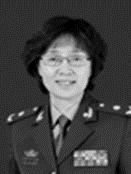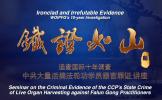Liu Zhihong

Summary: Liu Zhihong, female, born on December 26, 1958, major general. Currently serving as dean of Zhejiang University School of Medicine, Deputy Director of the General Hospital of Eastern Military Region (Formerly Nanjing General Hospital of Nanjing Military Region), director of the PLA Key Laboratory of Kidney Diseases, and director of the PLA Institute of Kidney Diseases. Kidney transplantation technology is one of the four major brand technologies of the institute. The hospital has a strong kidney transplantation team and does a large number of transplants. The PLA Institute of Kidney Diseases of the Nanjing Military Region General Hospital has a clinical treatment center with 210 beds, and the average length of stay in the institute are 9 days. The PLA Institute of Kidney Diseases is listed as a "top priority" institute by the CCP, and the income for its transplantation department is huge.
In view of the larger background of the Chinese Communist Party's state crime of organ harvesting from living Falun Gong practitioners, and Nanjing General Hospital of Eastern Military Region (Formerly Nanjing General Hospital of Nanjing Military Region) is implicated in the case, Liu Zhihong, deputy director of Nanjing General Hospital of Eastern Military Region, is a responsible party in the case.
Liu Zhihong
female, born on December 26, 1958. Academician of the Chinese Academy of Engineering. Vice President of the General Hospital of the Eastern Theater (formerly the Nanjing General Hospital of the Nanjing Military Region), Director of the PLA Institute of Kidney Diseases. Nephrologist. Graduated from Xinjiang Medical University in 1982 with a bachelor's degree. Graduated from the Second Military Medical University in 1989 with a master's degree. Studied at the National Institute of Health (NIH) in the United States from 1993 to 1995. Visiting scholar at the University of Washington School of Medicine in the United States from 1995 to 1996. Currently Dean of Zhejiang University School of Medicine, Director of the National Clinical Medical Research Center for Kidney Diseases of the General Hospital of the Eastern Theater of the People's Liberation Army, Director of the Clinical Medical Research Center for Kidney Diseases of Jiangsu Province, and Director of the Key Laboratory of Kidney Diseases of the PLA. [1] Served as Dean of Nanjing University School of Medicine in 2012; Served as Dean of Zhejiang University School of Medicine in 2018. In 2022, the Joint Logistics Support Force promoted (awarded) Liu Zhihong to the rank of professional and technical major generalii according to the order signed by Xi Jinping, Chairman of the Central Military Commission. [2]
Other positions: Visiting professor at Brown University School of Medicine; Council member of International Society of Nephrology (ISN), Executive member of Kidney Disease: Improving Global Outcomes (KDIGO), International CRRT committee member. Chief scientist of the National "973" Project.[3] The Institute of Nephrology and Blood Purification of Central South University is able to carry out kidney transplantation. Liu Zhihong was hired as the chief scientist of the institute. [4]
The hospital has a strong kidney transplant team and does a large number of transplants
Li Leishi (academician of the Renal Transplant Center of Nanjing General Hospital) performs 120 kidney transplants every year. In December 2008, Li Leishi published a paper titled "Organ Donation after Death Theoretically Exists, but is Difficult to Realize"[5] in China, saying: "There is a large shortage of organ transplant donors, because we are a research institute, so the number of operations performed was not a lot, but I used to perform kidney transplants for 120 patients a year."
Three doctors perform hundreds of kidney transplants in a year. An article titled "Interview with Academician Li Leishi"[6] published by "China Military Network" mentioned that in 2001, a medical accident occurred in the institute, and Li Leishi dismissed three doctors on duty. He said they "do hundreds of kidney transplants in a year". The way Li Leishi saw it, even if they were dismissed, the number of kidney transplants performed the following year would be reduced by a few only.
With a large number of kidney transplant doctors, multiple kidney transplant teams can be formed.
The Nephrology Institute of Nanjing General Hospital of Nanjing Military Command has specialized outpatient clinics, clinical treatment center, kidney biopsy diagnosis center, blood purification center, peritoneal dialysis center, kidney transplantation center, renal intensive care unit (RICU), and stem cell transplantation wards and Key Laboratory of Nephrology. The institute has four major brand technologies that are renal biopsy technology, renal pathological diagnosis technology, blood purification technology and kidney transplantation technology[7].
The Army Kidney Disease Research Institute of Nanjing Military Region General Hospital has a clinical treatment center with 210 beds[8]. The average length of stay in the institute are 9 days, significantly shorter than that of the same specialty in the same level hospitals[9]. The average length of hospital stay was shortened from 13.4 days in 2008 to 8.22 days in 2009, and the number of hospitalized patients increased from less than 4,000 cases per year in 2001 to nearly 7,000 cases per year in 2016[10].
WOIPFG released the list of transplant doctors in the hospital in 2014. There are nearly 30 kidney transplant specialists in the hospital, including 11 chief surgeons[11], 8 associate professors, 5 doctoral supervisors, 14 master supervisors, successively trained 69 doctoral candidates, 80 master candidates, and 10 postdoctoral candidates[12]. Multiple kidney transplant teams can be formed. The PLA Institute of Nephrology is listed as a “top priority” institute by the CCP.
The hospital's Nephrology Laboratory was approved as the key laboratory of kidney disease in the whole army in 1997. In 2000, it was listed as the "top priority" discipline of the whole army. In 2011, the hospital established the first "Nephrology Translational Medicine Research Center" in China. In the "China Hospital Best Specialty Ranking" published in March 2011, the Army Nephrology Research Institute of Nanjing General Hospital of Nanjing Military Region ranked first.[13]
In 2007, the CCP military stated in the "Decision to Learn from Li Leishi": "Li Leishi built the first Department of Nephrology in the army in 1979, with the 10,000-yuan start-up funds allocated by the hospital and only "two and a half" doctors. Two years later, he established the the National Society of Nephrology. Originally a physician, Li Leishi succeeded in getting into the kidney transplantation. The number of cases has grown from a dozen to more than 100, and the department led by Li became one of the largest kidney transplant centers in China, and by 2004, the number of kidney transplants exceeded 1,000 cases." [14]
So it’s clear that the CCP attaches great importance to the achievements in the field of transplantation, and because Li Leishi has outstanding achievements in the field of kidney transplantation, so CCP issued a "Decision to learn from Li Leishi"[15]. In 2000, the Institute of Kidney Diseases of the General Hospital of Nanjing Military Region was listed as a "Top Priority" research institute[16] by the Central Military Commission of the Communist Party of China. In 2004, the research institute was awarded the Collective First-class Merit by the CCP[17].
The hospital’s transplantation department enjoys a huge income.
According to a Financial News report on April 22, 2015, the revenue of the hospital increased from more than 200 million yuan to 500 million yuan in 2004, and the number of kidney transplants performed by the Institute of Nephrology exceeded 1,000 cases in 2004[18]. In the 2013’s annual list released in November 2014, Nanjing General Hospital ranked 29th, making to the list for five years in a row, and its nephrology department ranked second in the country[19]. According to a 2007 "China Military Network" report, Li Jieshou was in charge of the Military General Surgery Research Institute, formed 12 clinical medical research groups including transplantation, with 208 beds, an annual admission capacity of more than 5,000 patients, and an annual income of nearly 100 million yuan[20].
Li Leishi, former director of the PLA Institute of Nephrology, once said: "Organ donation after death only exists in theory in China, but it is not possible in reality, because there are no institutional and legal conditions for it to exist. Organ donation is not something that anyone can do. It has very high requirements for donors. Even if many patients who died of illness are willing to donate, it is difficult to donate successfully from a technical point of view. Without a set of regulations, when death has already occurred, contacting family members to discuss donation would have already missed the best time, and the organs would have been ischemic for too long and could no longer be used for transplantation. Therefore, in China, organ donation after death has no institutional soil to exist. In addition, legal protection is also one of the problems. China's brain death standards and organ donations are not legally protected. For doctors, if they perform surgery in such a legal vacuum, they will most likely face a criminal lawsuit, not a simple medical dispute. Sometimes, even if the organ donor has agreed to donate before his death, he or she may have to give up the donation or get into a lawsuit because of the family members. [21]"
Reference
[1] 《中国工程院》刘志红发布时间:2021-12-22
https://web.archive.org/web/20240524165355/http://ac.zju.edu.cn/2021/1222/c26279a2453592/page.htm
[2] 《百度百科》刘志红简介
https://web.archive.org/web/20240524170051/https://baike.baidu.com/item…
[3] Official Website of Nanjing General Hospital of Nanjing Military Command, Profile of Liu Zhihong
http://www.njzy666.com/homepage/showinfo?infoid=ebf11c3e-a3ce-4672-a81f…
[4] 《中南新闻网》中南大学肾脏病与血液净化研究所在湘雅医院成立2011/7/6
http://www.xiangya.com.cn/web/Content.aspx?chn=284&id=15062
追查国际存档链接:
http://www.zhuichaguoji.org/sites/default/files/report/2016/64700_06160…
《中南新闻网》中南大学肾脏病与血液净化研究所在湘雅医院成立09-03-28
http://cne.csu.edu.cn/Html/news/2009/328/12335D60I.html
追查国际存档链接:
http://www.zhuichaguoji.org/cn/images/nationalcriminalreports/178.png
[5]Website Health.sohu.com, Organ Donation after Death Theoretically Exists, but is Difficult to Realize, Li Leishi, November 27, 2008.
http://health.sohu.com/20081127/n260870584.shtml
WOIPFG Archived Link:
http://www.zhuichaguoji.org/cn/images/nationalcriminalreports/1066.png
[6] China Military Network, chinamil.com, Interview with Academician Li Leishi https://web.archive.org/web/20130606082614/http://www.chinamil.com.cn/s…
WOIPFG Archived Link:
http://www.zhuichaguoji.org/cn/images/nationalcriminalreports/1069.png
[7] Website haodf.com, General Hospital of Nanjing Military Command, Introduction to Nephrology
http://www.haodf.com/faculty/DE4rO-XCoLUnQ3sFh7UcoLDoWk/jieshao.htm
WOIPFG Archived Link:
http://www.zhuichaguoji.org/sites/default/files/report/2016/64700_06901…
[8] Website haodf.com (Good Doctors Online), General Hospital of Nanjing Military Command, Introduction to Nephrology
http://www.haodf.com/faculty/DE4rO-XCoLUnQ3sFh7UcoLDoWk/jieshao.htm
[9] Website haodf.com (Good Doctors Online), General Hospital of Nanjing Military Command, Introduction to Nephrology
http://www.haodf.com/faculty/DE4rO-XCoLUnQ3sFh7UcoLDoWk/jieshao.htm
[10] Official Website of Nanjing General Hospital of Nanjing Military Command, Institute of Nephrology
[11] WOIPFG Releases the List of 2, 096 Medical Personnel in 103 Chinese Military and Armed Police Force Hospitals Suspected of Harvesting Organs from Living Falun Gong Practitioners, October 28, 2014.
http://www.zhuichaguoji.org/node/45100#_Toc401944927 (Chinese)
https://www.upholdjustice.org/node/282 (English)
[12] Website haodf.com (Good Doctors Online), General Hospital of Nanjing Military Command, Introduction to Nephrology
http://www.haodf.com/faculty/DE4rO-XCoLUnQ3sFh7UcoLDoWk/jieshao.htm
[13] 南京军区南京总医院全军肾脏病研究所
[14] China Military Network, Decision on learning from Comrades Li Jieshou and Li Leishi
https://web.archive.org/web/20130606081811/http://www.chinamil.com.cn/s…
WOIPFG Archived Link:
http://www.zhuichaguoji.org/cn/images/nationalcriminalreports/1065.png
[15] China Military Network, Decision on learning from Comrades Li Jieshou and Li Leishi
https://web.archive.org/web/20130606081811/http://www.chinamil.com.cn/s…
WOIPFG Archived Link:
http://www.zhuichaguoji.org/cn/images/nationalcriminalreports/1065.png
[16] Xinhua Net, Institute of Military Nephrology
http://news.xinhuanet.com/mil/2009-06/03/content_11479483.htm
WOIPFG Archived Link:
http://www.zhuichaguoji.org/cn/images/nationalcriminalreports/598.png
[17] Website haodf.com, General Hospital of Nanjing Military Command, Introduction to Nephrology http://www.haodf.com/faculty/DE4rO-XCoLUnQ3sFh7UcoLDoWk/jieshao.htm
[18] China Military Network, Decision on learning from Comrades Li Jieshou and Li Leishi
https://web.archive.org/web/20130606081811/http://www.chinamil.com.cn/s…
WOIPFG Archived Link:
http://www.zhuichaguoji.org/cn/images/nationalcriminalreports/1065.png
[19] Boxun News, Chen Zhongliang, former political commissar of the Nanjing General Hospital of the Nanjing Military Commander, was taken away for investigation. April 23, 2015.
[20] China Military Network, Decision on learning from Comrades Li Jieshou and Li Leishi
https://web.archive.org/web/20130606081811/http://www.chinamil.com.cn/s…
[21] 《搜狐健康》黎磊石:死亡后器官捐献理论上存在 现实中难做到2008年11月27日
Sohu Health, Li Leishi: Organ donation after death exists in theory but is difficult to achieve in reality November 27, 2008




























































